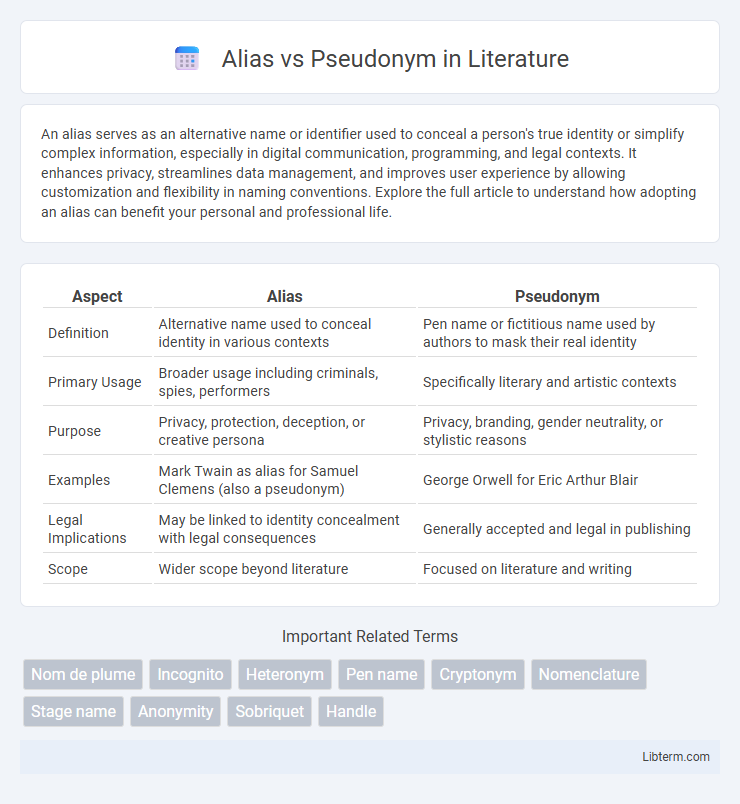An alias serves as an alternative name or identifier used to conceal a person's true identity or simplify complex information, especially in digital communication, programming, and legal contexts. It enhances privacy, streamlines data management, and improves user experience by allowing customization and flexibility in naming conventions. Explore the full article to understand how adopting an alias can benefit your personal and professional life.
Table of Comparison
| Aspect | Alias | Pseudonym |
|---|---|---|
| Definition | Alternative name used to conceal identity in various contexts | Pen name or fictitious name used by authors to mask their real identity |
| Primary Usage | Broader usage including criminals, spies, performers | Specifically literary and artistic contexts |
| Purpose | Privacy, protection, deception, or creative persona | Privacy, branding, gender neutrality, or stylistic reasons |
| Examples | Mark Twain as alias for Samuel Clemens (also a pseudonym) | George Orwell for Eric Arthur Blair |
| Legal Implications | May be linked to identity concealment with legal consequences | Generally accepted and legal in publishing |
| Scope | Wider scope beyond literature | Focused on literature and writing |
Understanding Alias and Pseudonym: Definitions
An alias is an alternate name used by a person to conceal their true identity, often for legal, professional, or security reasons. A pseudonym is a fictitious name adopted by an individual, typically authors or artists, to protect privacy or create a distinct persona. Both terms refer to names that differ from a person's legal name but serve specific purposes in identity management and personal branding.
Alias vs Pseudonym: Key Differences
Alias refers to an alternate name used to conceal a person's identity, often employed in legal or criminal contexts, while a pseudonym is a fictitious name adopted by authors, artists, or performers to mask their real identity and protect their privacy or brand. The key difference hinges on intent: aliases are typically used for anonymity in situations involving illicit or protective measures, whereas pseudonyms serve creative or professional purposes. Both terms represent names that differ from a legal identity but vary significantly in usage across social, legal, and artistic domains.
Common Uses of Aliases
Aliases are frequently used in legal and law enforcement contexts to protect identities during investigations or court proceedings. In digital security and online platforms, aliases serve as usernames or screen names, enhancing privacy and personal branding. Actors, writers, and artists often adopt aliases to separate their professional work from their private lives or to create memorable, marketable personas.
Why People Adopt Pseudonyms
People adopt pseudonyms to protect their privacy, especially in sensitive professions or controversial works. Writers and artists often use pseudonyms to create distinct identities separate from their personal lives or to appeal to different audiences. Pseudonyms also allow individuals to avoid discrimination or persecution based on their real names.
Legal Implications of Aliases and Pseudonyms
Aliases and pseudonyms hold distinct legal implications; an alias often serves as an alternate legal identity used in official documents or criminal records, whereas a pseudonym primarily protects privacy or artistic identity without legal recognition. Using an alias can affect legal proceedings, identity verification, and background checks, potentially implicating issues like fraud or misrepresentation if misused. Pseudonyms, while generally accepted in creative works or publications, may require disclosure in contracts or legal matters to ensure accountability and enforceability.
Alias and Pseudonym in Literature and Media
An alias typically refers to an alternate name used by a character or individual to conceal their true identity, often employed in literature and media to add layers of mystery or protect anonymity. A pseudonym, commonly used by authors and creators, serves as a fictitious name under which a person publishes work to separate their real identity from their creative persona. Both aliases and pseudonyms enhance storytelling by enabling complex character development and allowing creators to explore diverse narrative styles without personal attribution.
Cybersecurity: The Role of Aliases and Pseudonyms Online
Aliases and pseudonyms serve crucial roles in cybersecurity by protecting user identity and enhancing privacy during online interactions. Cybersecurity experts use aliases to mask their real identities when monitoring cyber threats or conducting penetration testing, minimizing exposure to retaliation. Pseudonyms enable individuals to participate in forums, social media, or whistleblowing platforms without revealing personal information, reducing risks of harassment or data breaches.
Famous Historical Aliases and Pseudonyms
Famous historical aliases and pseudonyms have played crucial roles in shaping identities and preserving anonymity, with figures like Mark Twain, the pseudonym of Samuel Clemens, standing out in literary history. Aliases such as Clara Bow's use of the name "The It Girl" highlight their function in creating iconic public personas. The strategic adoption of these names often provided safety, creative freedom, or enhanced celebrity appeal, deeply influencing cultural and historical narratives.
Choosing Between an Alias and a Pseudonym
Choosing between an alias and a pseudonym depends on the context of use and legal implications. An alias often serves as an alternate legal identity or nickname used for privacy or security, whereas a pseudonym is typically adopted by authors, artists, or public figures to separate personal identity from public work. Factors such as intended anonymity, legal protection, and social recognition should guide the decision when selecting between these two forms of alternate names.
Ethical Considerations in Using Aliases and Pseudonyms
Using aliases and pseudonyms raises significant ethical considerations, particularly regarding transparency, accountability, and potential deception. In journalistic or academic contexts, pseudonyms protect privacy while maintaining credibility, but misuse can undermine trust and facilitate fraud. Ethical use requires clear guidelines that balance individual privacy rights with the need for honesty and responsibility in communication.
Alias Infographic

 libterm.com
libterm.com